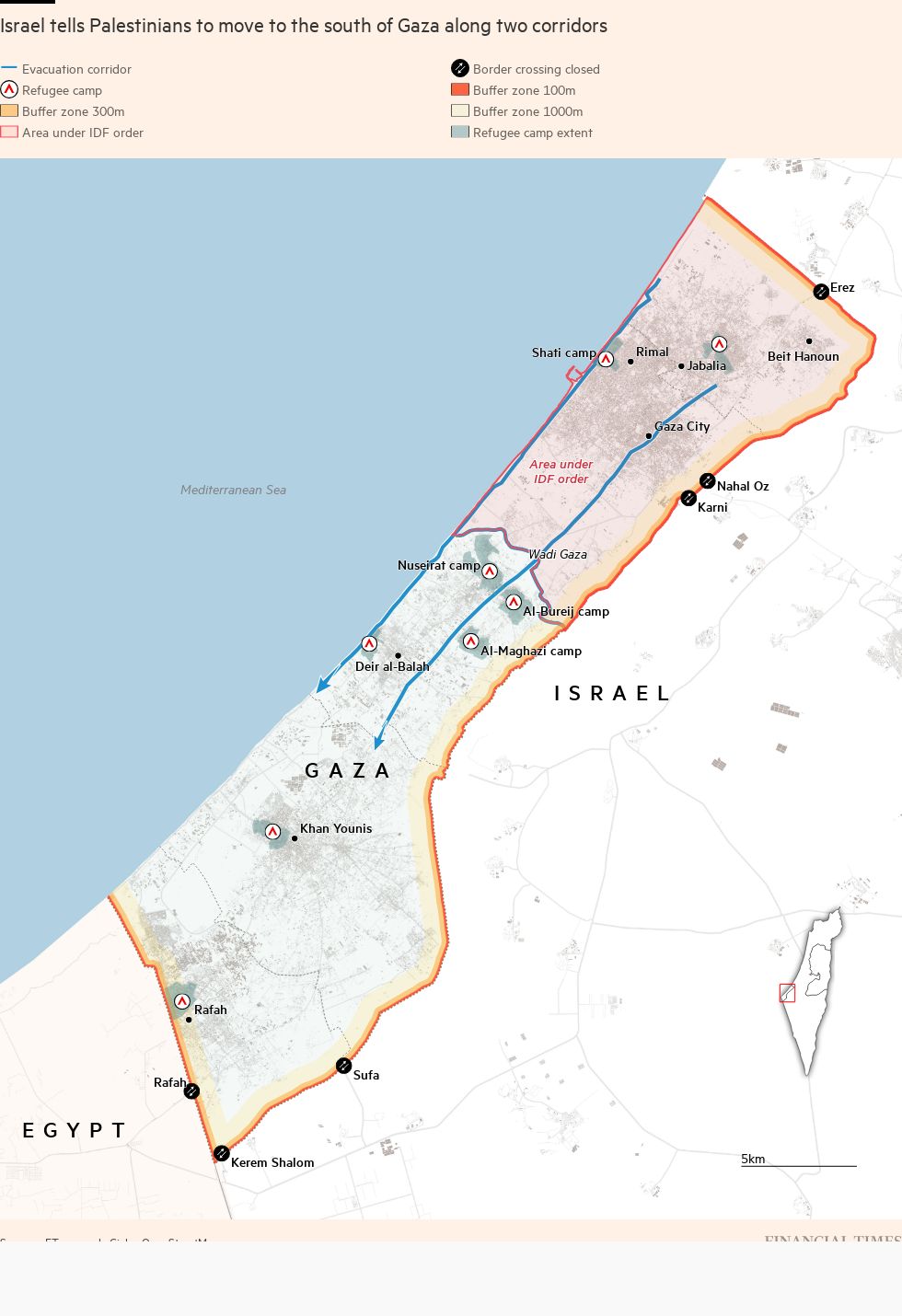Unlock the Editor’s Digest for free
Roula Khalaf, Editor of the FT, selects her favourite stories in this weekly newsletter.
Hospitals in Gaza are likely to run out of fuel within 24 hours, putting the lives of thousands of patients at “immediate risk”, the UN warned as Israel lays siege to the enclave in response to a devastating attack on its territory by Hamas.
Israel has been bombarding the Gaza Strip since Hamas militants carried out the deadliest ever assault on Israeli territory last week, and has also cut off supplies of electricity, water and goods to the coastal enclave.
Israeli forces have also ordered almost half of Gaza’s 2.3mn people to leave the north of the strip as they pound targets around Gaza City ahead of an expected ground invasion. Aid officials have warned that humanitarian conditions in the territory have reached breaking point.
Philippe Lazzarini, the head of UNRWA, the UN agency dealing with Palestinian refugees, said on Sunday that it was “no longer able to provide humanitarian assistance”, and that “an unprecedented humanitarian catastrophe is unfolding under our eyes”.
Lazzarini added: “The number of people seeking shelter in our schools and other UNRWA facilities in the south is absolutely overwhelming, and we do not have any more the capacity to deal with them.”
In recent days, talks have been under way to allow some foreign nationals to leave Gaza via the Rafah border crossing into Egypt. The US embassy in Israel on Monday advised those hoping to leave to move closer to the crossing, amid reports that it could open briefly at 9am local time.
But it warned that the situation was “fluid and unpredictable” and it is unclear whether, or for how long, travellers will be permitted to transit the crossing.
According to Israeli officials, more than 1,400 people were killed during Hamas’s assault, while more than 3,000 were wounded and about 120 were taken hostage. Palestinian health officials said on Sunday night that Israel’s bombardment had killed 2,670 people, and injured 9,600.
The spiralling violence has sparked concerns that the fighting between Israel and Hamas could spill over into a regional conflict. Hizbollah, the Iran-backed militia in southern Lebanon, and Israeli forces have repeatedly exchanged fire across the border in recent days, while there has also been a surge of violence in the occupied West Bank.
On Sunday, US president Joe Biden warned Iran against escalating the fighting between Hamas and Israel, while also saying that it would be a “big mistake” for Israel to reoccupy Gaza.
“Hamas and the extreme elements of Hamas don’t represent all the Palestinian people. And I think that . . . it would be a mistake . . . for Israel to occupy Gaza again,” Biden said in an interview with CBS, which was recorded on Thursday.
Israel-Hamas war
Hamas “must be eliminated entirely” but there “needs to be a Palestinian Authority” and a “path to a Palestinian state”, Biden said.
Israel’s ambassador to the UN, Gilad Erdan, said in response that Israel had “no interest to occupy Gaza or to stay in Gaza”, but insisted it had to “obliterate” Hamas.
However, he gave no information on how Israel envisaged the enclave’s governance would work once Hamas had been defeated.
“We would like to be co-ordinated with our American allies. But for now, the only focus should be how to release the hostages, how to secure our future by obliterating Hamas’s capabilities,” he told CNN.

